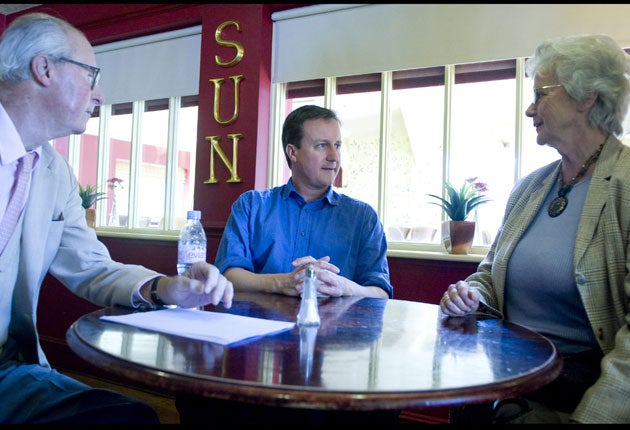Liberal surge is biggest shock to electoral landscape for years
Analysis: The changing dynamic since last week's debate means a hung parliament is a very real prospect

For the time being at least we are in uncharted waters. Never before have the polls put all three parties so close to each other during the course of an election campaign.
An election that last week the Conservatives looked close to being able to win outright now appears to be entirely up in the air. The ground was already starting to move even before Thursday night's debate. At 21 per cent, Liberal Democrat support was up on last week by two points, while the Tory lead over Labour had fallen back from nine points to six.
But now, in the immediate wake of the leaders' debate, the Liberal Democrats have gained a further nine points. At 30 per cent they are two points ahead of Labour and only two points behind the Conservatives. This represents the biggest shock to the political landscape since Labour's debacle in October 2007 over the election that never was.
A hung parliament now appears to be much more likely. But the movements also mean that, despite running third in votes, Labour's chances of coming first in seats are looking better than at any time since that 2007 crisis.
Even on 30 per cent, the electoral system is still likely to reward the Liberal Democrats with far fewer seats than the other two parties. They might still be slightly below 100 seats. But at the same time, the potential bias against the Conservatives means a four-point lead over Labour could be insufficient to make them the largest party – unless they really can perform better than average in the key marginals.
Two patterns appear to account for the Liberal Democrat surge. First, the party is now holding on to far more of those who said they voted for it last time. According to ComRes, 83 per cent of previous Liberal Democrats voters now propose to back the party again.
At the same time, the Liberal Democrats have won over the uncommitted – the people who tell ComRes they do not generally support any party. A week ago this group was inclined towards the Conservatives; nearly 40 per cent were going to back David Cameron. Now that figure has nearly halved, while no less than 56 per cent say they are going to back Nick Clegg.
Here, perhaps, is a group of voters who, disenchanted with Labour, were going to support the Conservatives as the least worst option. Now, when presented with an apparently more attractive alternative, they have, from David Cameron's point of view, been prised away all too easily.
How might they be won back again? Not, it seems, with threats about the dangers of a hung parliament. Not only do 90 per cent of Liberal Democrats think a hung parliament would be a good idea, but more than half of Conservative supporters would like Nick Clegg to have a role in the next government.
The Conservatives have already attacked the Liberal Democrats for opposing a like-for-like replacement for Trident. However, BPIX found that 46 per cent of voters are in favour of scrapping Trident and only 34 per cent are opposed.
Potentially more effective, perhaps, could be criticism of the Liberal Democrats for their proposed amnesty for long-term illegal residents. Liberal Democrat supporters may be relatively liberal on immigration but, even so, according to YouGov no less than 65 per cent of the public feel that too many immigrants are coming into Britain.
Labour has its own dilemma. Does it embrace the Liberal Democrats as potential allies in the battle to deny the Tories power? Or does it attack a political force that now threatens to capture some 30 or so Labour seats? The trouble with uncharted waters is that there is no reliable guide.
John Curtice is professor of politics at Strathclyde University
Subscribe to Independent Premium to bookmark this article
Want to bookmark your favourite articles and stories to read or reference later? Start your Independent Premium subscription today.

Join our commenting forum
Join thought-provoking conversations, follow other Independent readers and see their replies